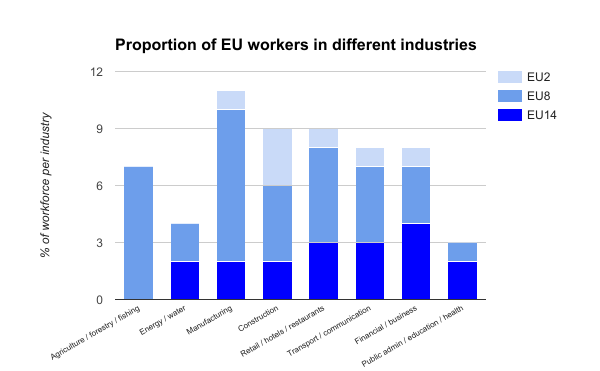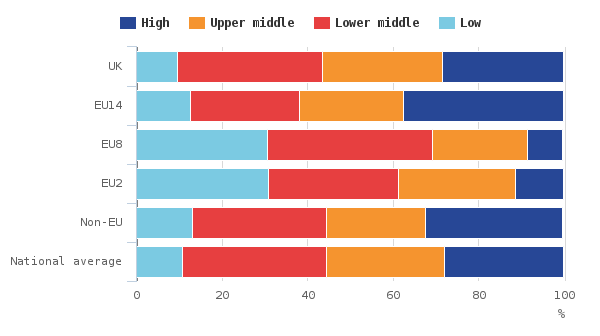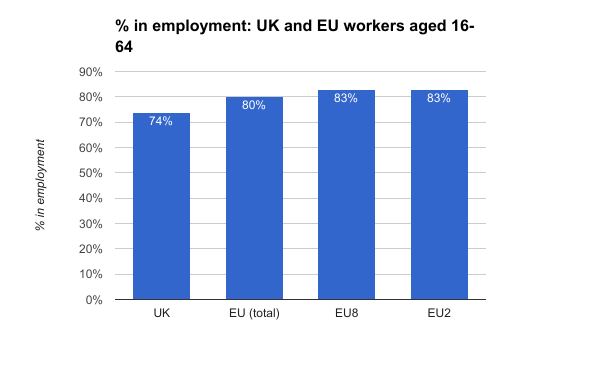Brexiters have been happy to play on fears that most EU workers are unskilled and that many are a drain on the welfare system. New labour market statistics bust these myths, while showing just how important EU nationals are to the UK economy.
Office for National Statistics figures reveal EU workers made up 7% of the 30 million British workforce in 2016, a total of 2.2 million EU workers. Separate statistics show that EU citizens make up roughly 5% of the total population.
EU workers are particularly predominant in some industries (see chart below). In sheer numerical terms, the retail, hotel and restaurant sector employs by far the most: over half a million.
Which countries people come from also affects where they work. Finance and business has the highest proportion of nationals from “old” EU countries (EU14). Nationals from the Eastern European states which joined the EU in 2004 (EU8) represent approximately 8% of workers in manufacturing. Meanwhile, the highest proportion of Romanians and Bulgarians (EU2) work in construction.

Source: ONS
Although the proportion of Eastern European workers in low-skilled work is high – and their hourly wage is a quarter less than the national average – no group of EU workers is found predominantly in what the ONS classes as low skilled work. Most are in middle-skilled jobs, which includes everything from managers and electricians to admin staff and hairdressers. Many from the EU14 countries are in high-skilled jobs, such as chief executives, teachers or engineers. (See chart below).
As economist Jonathan Portes argues, some Brexiters use bizarre definitions of “low skilled” to support their contention that most EU nationals have these jobs. For example, Steven Woolfe, the former UKIP migration spokesperson who quit the party after an altercation last year, sets the bar at anyone earning less than £35,000 – only about a quarter of UK workers earn more than this.

Source: ONS
The ONS data also disproves the idea that lots of EU workers don’t work and instead drain the UK welfare system. Over half of Eastern European workers work over 40 hours a week, compared to a third of UK nationals. What’s more, a higher proportion of working-age EU nationals are in employment than UK citizens. (See chart below).
The difference is not that there is a higher proportion of unemployed UK citizens, but that more UK workers are inactive for other reasons – for example studying, retirement, illness, disability or looking after family. Separate statistics show that UK citizens are also almost four times more likely to be aged 65 or over.

Source: ONS
What’s more, the age demographics of UK-born versus EU workers suggests it will actually be Brits who are putting pressure on services such as the NHS and social care in the years to come. Of the UK-born workforce, 17% are between 55 and 64 years old, compared to 6% of EU workers in the UK.
On the other end of the scale, 65% of EU workers are of the “millennial” generation between 20 and 39, compared to only 42% of British workers. It will be the taxes of these younger workers paying for the pensions and care of the older cohort as they retire in the next decade or so.
Edited by Hugo Dixon


Leave a Reply